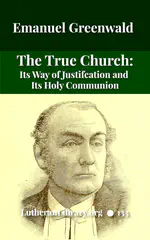V. 6. Blessed are they which do hunger and thirst after righteousness, for they shall be filled.
Righteousness must here not be understood as being the Christian righteousness in general, whereby the person becomes pious and acceptable before God. For I have before said that these eight beatitudes are nothing else than a teaching about the fruits and good works of a Christian, which must be preceded by faith, as the tree and main body or sum of his righteousness and blessedness, without any work or merit, out of which these beatitudes must all grow and follow. Therefore understand here the outward righteousness before the world, which we observe among ourselves towards others, that this is the meaning, short and simple, of these words: he is a really blessed man who perseveringly and assiduously strives to promote the general welfare and the right conduct of every one, and who helps to maintain and carry this out with word and deed, with counsel and act.
This is now also an excellent beatitude, which comprehends very many good works, but which is by no means common. For instance, that we may illustrate, if a preacher wishes to be counted as hungering and thirsting for righteousness, he must be ready to instruct and help every one in his calling, that he may conduct it properly and do what belongs to it, and when he sees that there is something wanting, and things do not go right, that he be on hand, warn, rebuke, and correct as well and by such means as he can: thus that I, as a preacher, be faithful to my office, and others to theirs, that they follow my teaching and preaching, and thus on both sides the right thing is done. Where now there are such people as take a special and earnest interest in gladly doing what is right, or in being found rightly at work, these may be said to be hungering and thirsting after righteousness. If this were the case there would be no knavery or injustice, but complete righteousness and blessedness on earth. For what is the righteousness of the world else than that every one do in his calling what is due? That means that every one’s rights should be duly regarded, those of the man, the woman, the child, the man servant and maid servant in the family, the citizen or the city in the land; and it all amounts to this, that those who are to oversee and rule other people execute this office with diligence, carefulness and fidelity, and that the others also faithfully and willingly render to these due service and obedience.
Nor does he without cause use the phrase: “Hunger and thirst after righteousness;” he means thereby to indicate that in order to attain it one must have great earnestness, a yearning eagerness and incessant diligence: that where there is a lack of this hunger and thirst, all will amount to nothing. The reason is this; for there are too many and great hindrances, both on the part of the devil, who is everywhere blocking the way, and on the part of the world, (namely his children,) which is so wicked that it cannot endure a pious man, who wants to do right or help others to do it; but it so annoys and worries him that in the end he loses patience and is out of humor about it. For it is painful to see how shamefully people act, and reward whole-hearted kindness with ingratitude, contempt, hatred and persecution. Hence also many persons who could not bear to witness this base conduct, at last grew desperate about it and took refuge in the wilderness, fleeing from human society and becoming monks, so that the saying has often been verified: “Despair makes a monk ;” either, that one does not trust to make his own living and runs into a monastery for his stomach’s sake, as the great crowd has done; or, that one despairs of the world and does not trust to remain pious in it or to help other people.
But this is not hungering and thirsting after righteousness. For he who wants to preach or rule in such a way, that he allows himself to be made weary and impatient, and to scamper off into a corner, he will be slow to help other people. It is not your duty to creep into a corner or into the wilderness, but to come out briskly, if you were therein, and offer both your hands and feet and your whole body for use, and hazard everything that you have and can do; and you are to be such a man as can be hard against hard, so as not to allow himself to be frightened off or dumfounded, or be overcome by the ingratitude or malice of the world: but you should always push along and persevere as much as possible. In short, you should have such a hunger and thirst after righteousness that will never diminish or cease and cannot be satiated, so that you care for nothing else, only so that you may accomplish and maintain what is right, despising on the other hand everything that would hinder you. If one cannot make the world altogether pious, let him do what he can. It is enough, that he has done his own duty, and has helped some, if only one or two. If the others will not follow, then let them go, in God’s name. One must not run off because of the wicked, but conclude: it was not undertaken for their sake, nor for their sake was it dropped; perhaps bye and bye some of them may come to their senses, or there may be fewer of them, and they may somewhat improve.
For here you have a consolatory, certain promise, with which Christ allures and attracts his Christians, that those who hunger and thirst after righteousness shall be filled; that is, that they shall be delightfully rewarded for their hunger and thirst by seeing that they have not labored in vain, and that at last some have been reached who have been benefited; and it will be manifest not only here upon earth, but still more hereafter, when every one will see what such people have accomplished by their diligence and perseverance, although things do not now go as they would like, and they have nearly lost heart; as when a pious preacher has snatched so many souls out of the jaws of the devil and brought them to heaven; or a pious faithful ruler has helped many lands and people, who bear this testimony of him and praise him before the whole world.
Just the opposite, are the sham saints who out of great sanctity forsake the world and run into the wilderness, or hide themselves in corners, so that they may escape the trouble and worry that they must otherwise endure, and pay no regard to what is going on in the world; never once thinking upon it that they ought to help or advise other people with doctrine, instruction, exhortation, reproof and correction, or at least with praying and supplication to God. Yes, they are disgusted with it, and grieve over it, that other people become pious, for they want to be considered the only holy ones, so that whoever wants to get to heaven must buy from them their good works and merit. In short, they are so full of righteousness that they look contemptuously upon other poor sinners, just as the great saint Pharisee, Luke 17, intoxicated with self-sufficiency, blurts out his contempt for the poor publican, is profuse in his self-congratulations, so that he pays his respects to God, and is thankful that he alone is pious and other people bad.
Observe, these are the people against whom Christ here speaks — the proud, self-sufficient spirits that tickle themselves with and find joy and pleasure in the fact that other people are not pious, whereas they ought to pity, compassionate and help them; they cannot do anything else but despise, backbite, judge and condemn everybody; and everything must be stench and filth except what they themselves do. But; that they should go and instruct and benefit a poor faulty sinner, that they shun as they would shun the devil. Therefore they will have to hear again, how Christ exclaims about them, Luke 6:25: “Woe unto you that are full, for ye shall hunger.” For as those shall be filled, who now hunger and thirst; so must those forever hunger, who now are so full and satiated, and yet no one can get any good from them, or boast that they have ever helped any one or led him in the right way. Now you have in a word the meaning of this beatitude, which (as above said) comprehends many good works, yes all good works, wherewith every one may live aright by himself among the people and help to give success to all sorts of offices and callings; as I have often shown elsewhere.



















.jpg)




